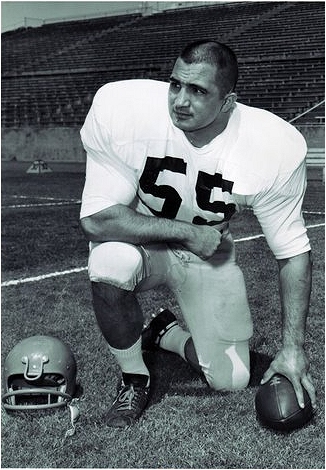 (June 5, 1942 – February 13, 1995) Oregon State football head coach Mike Riley likes to bill the Beavers as “Linebacker U” west coast and for good reason. Many recent Beavers have earned postseason honors and went on to the NFL. The lineage of linebackers that OSU has produced can be traced back decades and includes Jack “Mad Dog” O’Billovich in the mid-1960s. O’Billovich earned All-America honors as a junior and helped the Beavers play in the 1965 Rose Bowl. His honors also include All-Pac-8 Conference, All-Coast and team captain. His photo was the cover shot for the NCAA Official Collegiate Football Record Book 1965, with only one football player in the country being chosen for the honor. He concluded his collegiate career as one of a few Beavers to play in both the Hula Bowl and East-West Shrine Game. Jack was a 1966 OSU graduate in Forestry.
(June 5, 1942 – February 13, 1995) Oregon State football head coach Mike Riley likes to bill the Beavers as “Linebacker U” west coast and for good reason. Many recent Beavers have earned postseason honors and went on to the NFL. The lineage of linebackers that OSU has produced can be traced back decades and includes Jack “Mad Dog” O’Billovich in the mid-1960s. O’Billovich earned All-America honors as a junior and helped the Beavers play in the 1965 Rose Bowl. His honors also include All-Pac-8 Conference, All-Coast and team captain. His photo was the cover shot for the NCAA Official Collegiate Football Record Book 1965, with only one football player in the country being chosen for the honor. He concluded his collegiate career as one of a few Beavers to play in both the Hula Bowl and East-West Shrine Game. Jack was a 1966 OSU graduate in Forestry.
In 1964 he led the team, coached by the late Tommy Prothro, finished eighth-ranked in the country and ended the regular season beating top-20 Oregon in Eugene. “He was the toughest football player I have ever coached,” Prothro would later say. “He was a very loyal Oregon Stater, but he was a fine human being to start with.” His performance and passion on game day were mirrored in his training and practice during the week and in the off-season. Strength and Health magazine, February 1966, featured Jack in a story about his weight training program at OSU and his disciplined and healthy approach.
Following OSU, O’Billovich was drafted by the Detroit Lions where he played the first season, then played in 1967 with the Hamilton TigerCats of the Canadian Football League. The Butte, Montana, native was one of the first individuals to be inducted into the Oregon State University Sports Hall of Fame (1991).
Tony O’Billovich followed his dad’s footsteps to Oregon State, where he was an outstanding linebacker in the early 1990s. Tony was the team’s MVP and co-captain in 1993, and later played with the Toronto Argonauts in the Canadian Football League. Jack’s ashes were dispersed over the Tommy Prothro Football Complex (practice fields) “where he was most at home.”